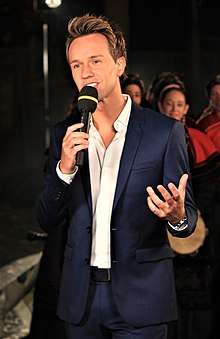Cyril Féraud
Cyril Féraud (born 15 March 1985 in Digne-les-Bains) is a French television presenter.
Cyril Féraud | |
|---|---|
 Féraud at the Festival Interceltique de Lorient in 2018. | |
| Born | 15 March 1985 |
| Nationality | French |
| Occupation | Television presenter |
| Years active | 2004–present |
| Employer | France 2, France 3 |
Career
Féraud's television career started back in 2004, when he hosted the programmes Zapping Zone and Art Attack for the French section of the Disney Channel, he then moved to France 3 and hosted the show Milles Familles. He also hosted the Kids' Choice Awards for the French section of Nickelodeon.
In 2006 he joined Europe 1 as a radio DJ along with Jean-Marc Morandini, he hosts the French Nation Lottery Loto (similar to EuroMillions) for France 2 since October 2008.
Since October 2009, he hosts the French game show Slam on France 3, taking over from Thierry Beccaro who was the previous host. He co-hosted the 2010 Sidaction, along with Patrick Sabatier.
He is the host of the French version of Pointless, under the name Personne n'y avait pensé ! (Nobody had thought of that!) between 16 July 2011 to 31 December 2011. On 23 July 2011, Féraud took part in the French series of Fort Boyard, as a contestant for the first time.[1] On 19 December 2011, he presented for the second year The Great Bloopers for France 3, from the island of Réunion.
Eurovision
Having awarded the French results at the 2011 Contest, Féraud provided the France 3 commentary for the Eurovision Song Contest final from Baku on 26 May 2012 and was accompanied by Mireille Dumas.[2] Féraud and Dumas returned to commentate for France at the 2013 Contest, and again for the 2014 Contest final on 10 May 2014, this time with Natasha St-Pier.
References
External links
- Cyril Féraud on IMDb